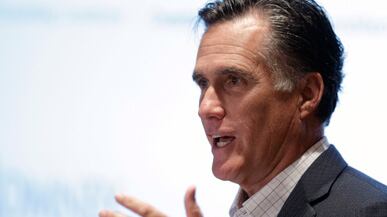Mitt Romney wanted desperately to get out of the health-care swamp. The former Massachusetts governor has been in electoral purgatory since last year, unable to take his pre-campaign operation prime time, and his main bit of baggage has always been health care. Romney’s 2006 health-care law in Massachusetts looks a lot like Obama’s federal law, which Republicans have staked 2012 on repealing.
So Romney’s highly publicized speech Thursday afternoon at the University of Michigan was designed to stop the bloodletting, and confront his record. He had tried before in a speech in March and in several interviews over the past year, including with Newsweek, but none of those efforts had stuck.
“I’m going to talk today about repealing and replacing the president’s health-care system. And I know that some people when I talk about doing that say, wait a minute, I’ve heard that your plan in Massachusetts is a lot like President Obama’s plan,” he said, perfectly summing up the mountain he is having to climb to be taken seriously by Republican voters and donors.
While the would-be candidate took a few dozen people through the differences between his health-care plan and Obama’s, critics panned the speech online. His body language showed some nervousness. The room only appeared to be about half full. And he built his primary argument around defending his plan’s individual mandate to buy insurance, which remains the radioactive nub of Obama’s law. “The problem Romney can't overcome is the individual mandate is good policy and he knows it,” tweeted The Washington Post scribe Ezra Klein.
The White House, predictably, had no immediate comment about Romney’s news conference, even though staffers in recent weeks have snidely joked that Romney’s framework was what inspired Obama in the first place. But at least one of Romney’s would-be opponents piled on. "This is not a failure of execution but a lack of foresight on Governor Romney's part,” said declared candidate Rick Santorum.
Romney defended his plan’s individual mandate to buy insurance—which remains the radioactive nub of Obama’s law.

Speeches rarely are the best venue to discuss policy, which can be thorny and complex. Romney flopped around in the policy weeds for the better part of an hour, pointing to relatively small differences in what both plans were designed to do. He used Washington-speak—acronyms like the NLRB, and the ambiguous term “co-insurance”—that most of the country wouldn’t understand. In some instances, he sounded a lot like the 2010 Obama, lamenting things like the “freeloader problem” of people getting taxpayer-funded care in emergency rooms.
For several months, pundits had suggested that, to put the issue behind him, Romney should just cut his losses. Declare it a mistake that seemed better in theory than in practice, then pivot to the argument that he’s seen what doesn’t work, which makes him uniquely qualified to address Obamacare’s shortfalls. But Romney took aim at the unsolicited advice. “There's only one problem with that,” he said, “it wouldn't be honest.”
After the speech, Washington’s policy wonks batted around how the governor did. Few analysts—even conservative ones—who spoke with The Daily Beast were swayed. Michael Cannon of the libertarian Cato Institute said that aside from making an unconvincing case, Romney could soil the repeal effort for the entire GOP by defending the nuances of Obama’s controversial law. “He’s hurting the cause of repeal by trying to salvage his own political viability,” Cannon said.
But by the end of the speech, as Romney worked the room shaking hands and posing for pictures, the former governor appeared to win on at least one count. He came off as authentic, and cognizant that policy is often much more complex than sound-bite politics. The point of his windy address seemed to be that the nuances of health care can’t be boiled down to 30-second attack ads. That kind of an admission is what could make Romney a decent president. Of course, the same quality could well prevent him from getting there.
Daniel Stone is Newsweek's White House correspondent. He also covers national energy and environmental policy.





